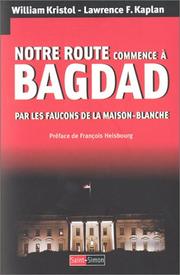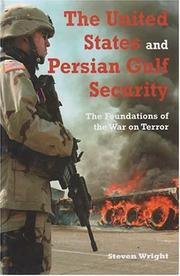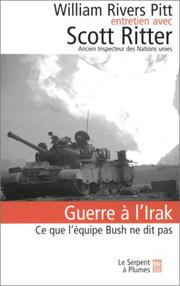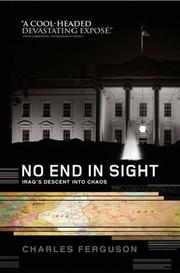| Listing 1 - 9 of 9 |
Sort by
|
Book
ISBN: 9780415719902 9781315867014 9781317962427 9781317962434 131586701X 0415719909 Year: 2014 Volume: *12 Publisher: Abingdon, Oxon: Routledge,
Abstract | Keywords | Export | Availability | Bookmark
 Loading...
Loading...Choose an application
- Reference Manager
- EndNote
- RefWorks (Direct export to RefWorks)
"This book provides a descriptive and analytical narrative of the evolution of US foreign policy towards Iraq at the supra-national (global), national (Arab Iraq) and sub-national (Iraqi Kurdistan) levels. The book is unique in that it presents a sophisticated insight into the two major components of US Iraq policy. To achieve this, it addresses US foreign policy towards both Arab Iraq and an entirely original analysis on US policy towards the Iraqi Kurds as components of a larger US Iraq policy, dictated by the supreme US Grand Strategy. The book also examines whether US foreign policy towards Iraq has been one of continuity or change--a dimension that has not been illustrated in any other publication. The book deals intelligently and at great length with the events surrounding US Iraq policy, going back to 1979 with regard to Arab Iraq, and 1961 in respect to the Kurdish liberation movement, covering all subsequent US administrations including the Obama presidency. It provides a thorough examination of US interests in Iraq and reasons for the 2003 invasion and its aftermath. It also engages with the intellectual roots of US foreign policy, presenting an intricate reaction of views, objectives and agendas. This work will be of interest to students and scholars of Middle East studies, US Foreign Policy and Security studies. "--
Book
ISSN: 10177566 ISBN: 9291980757 9789291980758 Year: 2005 Volume: 79 Publisher: Paris: European Union. Institute for Security Studies,
Abstract | Keywords | Export | Availability | Bookmark
 Loading...
Loading...Choose an application
- Reference Manager
- EndNote
- RefWorks (Direct export to RefWorks)
Two years after George W. Bush declared the end of major combat operations in Iraq, the country is still far from stable. A fierce insurgency is still hampering the reconstruction of the country’s infrastructure and the development of the political process. On the other hand, success, however limited, cannot be denied: on 30 January 2005 Iraqis cast their ballots to elect a Transitional Assembly in most provinces of the country and a new government was inaugurated by the end of March 2005. The tasks are challenging, though, even without the precarious security situation: the National Assembly has to draft and vote on a constitution no later than 15 August 2005, a referendum on the constitution is scheduled for 15 October 2005 and new elections will follow on 15 December 2005. In all this, international support is important, maybe essential, but Iraq’s destiny lies as much with the international community as it does with its people and its leaders’ ability to overcome ethnic and sectarian divisions and make Iraq a functioning state. This Chaillot Paper aims to help to formulate a European position on Iraq based on a realistic assessment of the situation on the ground. ‘Looking into Iraq’ is neither an ethnographic, sociological nor a historical study or a mere policy paper, though aspects of these disciplines are used by authors, depending on their academic background. The paper focuses rather on those issues whose understanding is key to proper analysis. To achieve this a group of renowned scholars and experts were asked to write short pieces on Iraq, each of them with a different focus, covering : the current situation inside the country and possible future developments among the most important driving forces in Iraq ; this of course includes an analysis of the most important ethnic/sectarian cleavages in the country ; the outcome of the elections and the next steps for further democratisation ; aims and intentions of the United States in Iraq ; and finally a possible role for the EU.
Elections --- European Union --- Foreign relations --- Iraq --- United States --- Irak --- Etats-Unis --- Politics and government --- Ethnic relations --- Politique et gouvernement --- Relations interethniques --- Relations extérieures --- European Union countries --- Relations extérieures --- Elections - Iraq --- Iraq - Politics and government - 2003 --- -United States - Foreign relations - Iraq --- Iraq - Foreign relations - United States --- European Union countries - Foreign relations - Iraq --- Iraq - Foreign relations - European Union countries
Book
ISBN: 9780415563970 9780415522816 9780203843413 9781136912665 9781136912610 9781136912658 0415522811 0415563976 Year: 2011 Publisher: Milton Park [England]: Routledge,
Abstract | Keywords | Export | Availability | Bookmark
 Loading...
Loading...Choose an application
- Reference Manager
- EndNote
- RefWorks (Direct export to RefWorks)
Postwar reconstruction --- United States --- Japan --- Iraq --- Foreign relations --- Postwar reconstructionUnited States --- IraqForeign relations --- Postwar reconstruction - Case studies --- Postwar reconstruction - Japan --- Postwar reconstruction - Iraq --- United States - Foreign relations - Japan --- Japan - Foreign relations - United States --- United States - Foreign relations - Iraq --- Iraq - Foreign relations - United States
Book
ISBN: 9781107170773 110717077X 9781316621806 1316621804 9781316756805 1316767280 1316762246 1316756807 Year: 2017 Publisher: Cambridge, United Kingdom: Cambridge university press,
Abstract | Keywords | Export | Availability | Bookmark
 Loading...
Loading...Choose an application
- Reference Manager
- EndNote
- RefWorks (Direct export to RefWorks)
"After a decade and a half of war in Iraq and Afghanistan, US policymakers are seeking to provide aid and advice to local governments' counterinsurgency campaigns rather than directly intervening with US forces. This strategy, and US counterinsurgency doctrine in general, fail to recognize that despite a shared aim of defeating an insurgency, the US and its local partner frequently have differing priorities with respect to the conduct of counterinsurgency operations. Without some degree of reform or policy change on the part of the insurgency-plagued government, American support will have a limited impact. Using three detailed case studies--the Hukbalahap Rebellion in the Philippines, Vietnam during the rule of Ngo Dinh Diem, and the Salvadorian Civil War--Ladwig demonstrates that providing significant amounts of aid will not generate sufficient leverage to affect a client's behaviour and policies. Instead, he argues that influence flows from pressure and tight conditions on aid rather than from boundless generosity."--
Counterinsurgency --- United States --- Afghanistan --- Iraq --- Foreign relations --- Intervention (International law) --- Military assistance, American --- American military assistance --- Military intervention --- Diplomacy --- International law --- Neutrality --- Counterguerrilla warfare --- Guerrilla warfare --- Insurgency --- History --- History, Military --- United States - Foreign relations --- United States - Foreign relations - Iraq --- Afghanistan - Foreign relations - United States --- Iraq - Foreign relations - United States --- United States - Foreign relations - Afghanistan

ISBN: 2915134049 9782915134049 Year: 2003 Publisher: Neuilly-sur-Seine: Saint-Simon,
Abstract | Keywords | Export | Availability | Bookmark
 Loading...
Loading...Choose an application
- Reference Manager
- EndNote
- RefWorks (Direct export to RefWorks)
Militarism --- Hussein, Saddam, --- United States --- Iraq --- Foreign relations --- Military policy --- Doctrines militaires --- Terrorisme --- Relations --- Relations extérieures --- Ḥusayn, Ṣaddām --- Bush, George Walker --- États-Unis --- Politique militaire --- Bush, George W. --- Militarism - United States --- Hussein, Saddam, - 1937-2006 --- United States - Foreign relations - Iraq --- Iraq - Foreign relations - United States --- Iraq - Foreign relations - 1979-1991 --- Iraq - Foreign relations - 1991 --- -United States - Military policy --- Relations extérieures --- Ḥusayn, Ṣaddām --- États-Unis

ISBN: 2842613473 9782842613471 Year: 2002 Publisher: Paris: Le Serpent à plumes,
Abstract | Keywords | Export | Availability | Bookmark
 Loading...
Loading...Choose an application
- Reference Manager
- EndNote
- RefWorks (Direct export to RefWorks)
United States --- Iraq --- Arab countries --- Foreign relations --- 327.5 <73> --- Internationale conflicten. Internationale spanningen. Internationale blokvorming. Veiligheidspolitiek--Verenigde Staten van Amerika. VSA. USA --- 327.5 <73> Internationale conflicten. Internationale spanningen. Internationale blokvorming. Veiligheidspolitiek--Verenigde Staten van Amerika. VSA. USA --- United States - Foreign relations - Iraq --- Iraq - Foreign relations - United States --- United States - Foreign relations - 1989 --- -United States - Foreign relations - Arab countries --- Arab countries - Foreign relations - United States

ISBN: 9780863723216 0863723217 Year: 2007 Publisher: Reading: Ithaca press,
Abstract | Keywords | Export | Availability | Bookmark
 Loading...
Loading...Choose an application
- Reference Manager
- EndNote
- RefWorks (Direct export to RefWorks)
The international relations of the Persian Gulf have long been dominated by power politics. Its unrivalled energy resources have historically made this geopolitical arena a vital national security interest for the United States. Historically, Persian Gulf security became synonymous with the maintenance of the political status quo, but with the onset of the War on Terror, US foreign policy has shifted in priority towards combatting the root causes of Islamic extremism. The age-old policy of maintaining stability to ensure a free and secure flow of energy is now recognized as having fuelled Islamic extremism. The new strategic objective for the United States is to see a complete overhaul of the political systems within the region and to develop a culture of political participation to achieve regional security and ensure US homeland security. It is a new agenda wholly in keeping with the messianic Wilsonian values that have long been part of US foreign policy. The purpose of this book is to offer a detailed analysis of US foreign policy towards Iran and Iraq since the onset of the post-Cold War era and to chart its developments and changes right through to the contemporary period of the War on Terror epitomized by the Presidency of George W. Bush. It also provides a detailed examination of US foreign policy towards political Islam to show why and how US strategic interests have so fundamentally changed since the trauma of the 9/11 attacks. Written in a clear and accessible style, the book is sure to prove invaluable for students, policymakers, and the general reader interested in the politics and security of this highly important but volatile region of the Middle East.
GWOT, 2001-2009 (War on Terrorism) --- Global War on Terror, 2001-2009 --- Guerre contre le terrorisme, 2001-2009 --- Oorlog tegen het terrorisme, 2001-2009 --- War against Terrorism, 2001-2009 --- War on Terror, 2001-2009 --- War on Terrorism, 2001-2009 --- Persian Gulf Region --- United States --- Iraq --- Iran --- Foreign relations --- 1993-2001 --- 2001-2009 --- Persian Gulf Region - Foreign relations - United States --- United States - Foreign relations - Persian Gulf Region --- United States - Foreign relations - 1993-2001 --- United States - Foreign relations - 2001 --- -United States - Foreign relations - Iraq --- United States - Foreign relations - Iran --- Iraq - Foreign relations - United States --- Iran - Foreign relations - United States

ISBN: 2842614062 9782842614065 Year: 2002 Publisher: Paris: Le Serpent à plumes,
Abstract | Keywords | Export | Availability | Bookmark
 Loading...
Loading...Choose an application
- Reference Manager
- EndNote
- RefWorks (Direct export to RefWorks)
En 1998, au terme de sept années de mission en Irak, Scott Ritter et les inspecteurs mandatés par les Nations unies ont confirmé la destruction de l'arsenal d'armes biologiques, chimiques et nucléaires de l'Irak. Pourquoi, dès lors, mener une nouvelle guerre à l'Irak ? Scott Ritter et William Rivers Pitt analysent les raisons d'une guerre annoncée contre l'Irak par la Maison blanche et soulignent l'absence totale de liens entre Al Qaida et Saddam Hussein (d'ailleurs cible d'Oussama Ben Laden, comme de George W. Bush). Scott Ritter et William Rivers Pitt démontrent pourquoi un changement de régime, appelé de leurs voeux par MM. Bush et Blair, est absurde et ne conduirait pas nécessairement à la démocratie dans un pays divisé depuis des siècles. Au final, ils mettent en garde contre les conséquences désastreuses d'une telle action conjointe des forces armées américaines et britanniques
Weapons of mass destruction --- Arms control --- Disarmament --- Verification --- Inspection --- Ritter, Scott --- United Nations. --- Iraq --- United States --- Foreign relations --- 327.5 <73> --- 327.5 <567> --- 623.45 --- Internationale conflicten. Internationale spanningen. Internationale blokvorming. Veiligheidspolitiek--Verenigde Staten van Amerika. VSA. USA --- Internationale conflicten. Internationale spanningen. Internationale blokvorming. Veiligheidspolitiek--Irak --- Munitie. ABC-wapens --- 327.5 <567> Internationale conflicten. Internationale spanningen. Internationale blokvorming. Veiligheidspolitiek--Irak --- 327.5 <73> Internationale conflicten. Internationale spanningen. Internationale blokvorming. Veiligheidspolitiek--Verenigde Staten van Amerika. VSA. USA --- Weapons of mass destruction - Iraq --- Arms control - Verification - Iraq --- Disarmament - Inspection - Iraq --- Ritter, Scott - Interviews --- Iraq - Foreign relations - United States --- United States - Foreign relations - Iraq

ISBN: 9781586486082 158648608X 0786732342 Year: 2008 Publisher: New York (N.Y.): PublicAffairs,
Abstract | Keywords | Export | Availability | Bookmark
 Loading...
Loading...Choose an application
- Reference Manager
- EndNote
- RefWorks (Direct export to RefWorks)
The basis for the award-winning documentary: ""A clear, temperate, and devastating account of high-level arrogance and incompetence."" ?The New York Times
Iraq War, 2003-2011 --- Insurgency --- Internal security --- Guerre en Irak, 2003-2011 --- Révoltes --- Sûreté de l'Etat --- Iraq --- United States --- Irak --- États-Unis --- Etats-Unis --- Politics and government --- Armed Forces --- Relations --- Politique et gouvernement --- Forces armées à l'étranger --- Armed forces --- Révoltes --- Sûreté de l'Etat --- États-Unis --- Forces armées à l'étranger --- Bush, George W - Military leadership. --- Iraq - Foreign relations - United States. --- Iraq War, 2003-. --- Iraq War, 2003- - Campaigns. --- Iraq War, 2003- - Causes. --- Iraq War, 2003- - Military intelligence. --- United States - Foreign relations - Iraq. --- United States - Military policy. --- United States - Politics and government - 2001-. --- Regions & Countries - Asia & the Middle East --- History & Archaeology --- Middle East --- Insurgency - Iraq --- Internal security - Iraq --- Iraq - Politics and government - 2003 --- -United States - Armed forces - Iraq --- United States - Relations - Iraq --- Iraq - Relations - United States
| Listing 1 - 9 of 9 |
Sort by
|

 Search
Search Feedback
Feedback About UniCat
About UniCat  Help
Help News
News